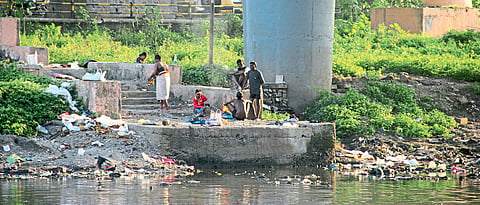

“River?
What river?
That is a gutter!”
How many times have you heard this refrain about the Mula and the Mutha? The two rivers are so heavily polluted that they seem more like drains to several Pune residents. To top off the stench of the rivers in the city, a recent study by scientists from the city and their counterparts in Australia, with the support of the Australia-India Council, found that microbes found in these two water bodies are highly resistant to drugs. Researchers behind the study have said that they fear that these microbes might become pan-drug resistant in the future.
The source of this threatening increase in deadly microbes and the stench of the river is the untreated sewage which is released directly into the rivers due to inadequate sewerage system and sewage treatment capacity.
In response to this health hazard, Manish Ghorpade, a resident of the city and one of the directors of city-based NGO Jeevitnadi, has started a petition demanding that 100 per cent sewage of Pune city be treated on war footing to avoid a public health emergency. Since January 21, over 1,700 people have signed this petition on the change.org platform. The petition will be submitted to Mukta Tilak, Mayor of Pune City; Kunal Kumar, Municipal Commissioner, Pune; and Shravan Hardikar, PCMC Commissioner.
The Central Pollution Control Board has identified the Mula-Mutha as one of the 302 polluted rivers in India. According to PMC’s budget for 2017-18, of the 744 million litres of waste water generated per day in Pune, there is a capacity to treat 567 million litres, which is 76 per cent.
The petition makes four demands of the Pune Municipal Corporation and Pimpri-Chinchwad Municipal Corporation authorities. The first is that an audit of existing sewage treatment plants (STPs) should be conducted by an independent agency. The second demand is that measures should be taken to restore effectiveness of the existing STPs based on observations/recommendations. The petition then demands that a real time, continuous monitoring system of water quality must be installed at the outlet of STPs, and that this data should be made public. Finally, the petition demands the formation of an empowered committee to fast-track installation of new STPs to achieve 100 per cent sewage treatment in a committed and time-bound manner.
The main trigger for Ghorpade to start the petition now is the alarming microbe study. He hopes the petition will build positive pressure on the authorities, and show them that people are demanding immediate action to treat sewage. Authorities have to be made aware, citizens can’t deal with this problem at the individual level, said Ghorpade.
His next step is to get more people on board, and take this petition to the authorities. “And if the authorities permit, have a dialogue with them,” he said, adding, “I am hopeful that authorities will take note of this. We have been struggling with the problem of sewage treatment for a couple of decades. There actually shouldn’t be a problem, as there is adequate technology and funding. I feel there is a gap in priority given to this issue.”
A project for pollution abatement in the Mula-Mutha was launched in January 2016, with a loan of Rs 1,000 crore from the Japan International Cooperation Agency (JICA). However a consultant was appointed only in December 2017 for this project, which is scheduled to be completed by January 2022.
